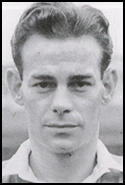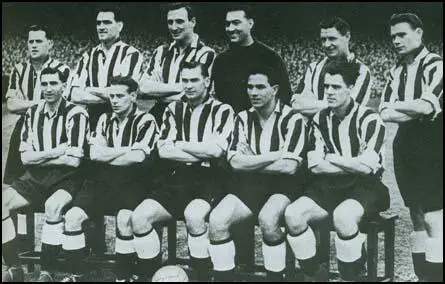Ernie Taylor

Ernest (Ernie) Taylor was born in Sunderland on 2nd September 1925. He played football for Hylton Colliery before signing for Newcastle United in September 1942. During the Second World War he scored 7 goals in 26 games for the club.
Taylor made his Football League debut against Barnsley on 5th January 1946. The team that year included Tommy Walker, Bobby Corbett, Len Shackleton, Bobby Cowell, Jackie Milburn, Charlie Crowe, Joe Harvey and Charlie Wayman.
In the 1947-48 season Newcastle United won promotion to the First Division. Taylor, an inside-forward, only played in eight games that season. The following season Taylor established himself in the first-team scoring three goals in 28 appearances. Paul Joannou points out in The Black 'n' White Alphabet: "Ernie Taylor was barely 10 stones and at only 5 foot 4 inches was a titch among giants on the football field. Wearing only size 4 boots, Taylor though had the skill and the eye for a telling pass that made him one of the most productive schemers in the country."
Taylor scored 8 goals in 40 games in the 1950-51 season and helped the club to finish 4th in the First Division. The team that year included Bobby Cowell, Joe Harvey, Frank Brennan, Jack Fairbrother, Bobby Corbett, Tommy Walker, Charlie Crowe, Jackie Milburn, George Robledo and Bobby Mitchell. Newcastle also enjoyed a good FA Cup run beating Bolton Wanderers (3-2), Stoke City (4-2), Bristol Rovers (3-1) and Wolverhampton Wanderers (2-1) to reach the final against Blackpool.
The defences were in control in the first-half. The deadlock was broken in the 50th minute when Jackie Milburn collected a pass from George Robledo to fire home. Five minutes later, Ernie Taylor cleverly back-heeled the ball. As Milburn later recalled: "I struck it with all my might and from 28 yards it flew straight as an arrow into the back of the net." The game ended 2-0 and Taylor had won his first FA Cup winners' medal.
Stanley Matthews, who was in the Blackpool side that was beaten that day, described Taylor as the "architect of our cup final defeat" urged the club manager, Joe Smith, to buy the man who was nicknamed "Tom Thumb". Matthews later recalled: "Ernie was a cheeky, confident player who on his day verged on the brilliant. Despite his slight build, he could ride even the most brusque of tackles with aplomb and he could crack open even the most challenging and organised of defences."

Joe Smith took the advice of Stanley Matthews and in October 1951, paid £25,000 for Taylor. He had 21 goals in 117 games for Newcastle United. Taylor joined a team that included Stanley Matthews, Hughie Kelly, Stan Mortensen, Harry Johnson and Bill Perry.
In the 1952-53 season beat Huddersfield Town (1-0), Southampton (2-1), Arsenal (2-1) and Tottenham Hotspur (2-1) to reach the FA Cup final for the third time in five years. Cyril Robinson claimed that Joe Smith, the Blackpool manager "was never very tactical, he was very blunt with his instructions". According to Stanley Matthews he said: "Go out and enjoy yourselves. Be the players I know you are and we'll be all right."
Cyril Robinson was later interviewed about the match: "We kicked off and within a couple of minutes we had a goal scored against us. That's about the worst thing that could happen. Gradually we got some passes together, got Stan Matthews on the ball and Mortensen got the equaliser, but they went back ahead straight away." Stanley Matthews wrote in his autobiography that: "At half-time we sipped our tea and listened to Joe. He wasn't panicking. He didn't rant and rave and he didn't berate anyone. He simply told us to keep playing our normal game." Harry Johnson, the captain, told the defence to "be more compact and tighter as a unit." He also added: "Eddie (Shinwell), Tommy (Garrett), Cyril (Robinson) and me, we will deal with the rough and tumble and win the ball. You lot who can play, do your bit."
Despite the team-talk Bolton Wanderers took a 3-1 lead early in the second-half. Robinson commented: "It looked hopeless then, I was thinking to myself at least I've been to Wembley." Then Stan Mortensen scored from a Stanley Matthews cross. According to Matthews: "although under pressure from two Bolton defenders who contrived to whack him from either side as he slid in, his determination was total and he managed to toe poke the ball off the inside of the post and into the net."
In the 88th minute a Bolton defender conceded a free kick some 20 yards from goal. Stan Mortensen took the kick and according to Robinson: "I've never seen one taken as well. It flew, you couldn't see the ball on the way to the net." Matthews added that "such was the power and accuracy behind Morty's effort, Hanson in the Bolton goal hardly moved a muscle."
The score was now 3-3 and the game was expected to go into extra-time. In his autobiography, Stanley Matthews described what happened next: "A minute of injury time remained... Ernie Taylor, who had not stopped running throughout the match, picked up a long throw from George Farm, rounded Langton and, as he had done like clockwork through the second half, found me wide on the right. I took off for what I knew would be one final run to the byline. Three Bolton players closed in, I jinked past Ralph Banks and out of the corner of my eye noticed Barrass coming in quick for the kill. They had forced me to the line and it was pure instinct that I pulled the ball back to where experience told me Morty would be. In making the cross I slipped on the greasy turf and, as I fell, my heart and hopes fell also. I looked across and saw that Morty, far from being where I expected him to be, had peeled away to the far post. We could read each other like books. For five years we'd had this understanding. He knew exactly where I d put the ball. Now, in this game of all games, he wasn't there. This was our last chance, what on earth was he doing? Racing up from deep into the space was Bill Perry."
Stanley Matthews added that Perry "coolly and calmly stroked the ball wide of Hanson and Johnny Ball on the goalline and into the corner of the net." Bill Perry admitted: "I had to hook it a bit. Morty said he left it to me, but that's not true, it was out of his reach." Blackpool had beaten Bolton Wanderers 4-3. Taylor had won his second cup-winners medal.
Taylor won his first international cap for England against Hungary on 25th November 1953. The team that day included Stanley Matthews, Stan Mortensen, Harry Johnson and Billy Wright. England lost 6-3 and it was the last time Taylor was selected to play for his country.
In February 1958 Taylor was transferred to Manchester United for a fee of £6,000 in an effort to help them after the Munich air disaster. He had scored 53 goals in 217 league games for Blackpool. Taylor helped United reach the 1958 FA Cup Final. However, they were beaten 2-0 by Bolton Wanderers.
After playing 22 games for Manchester United Taylor joined Sunderland in December 1958. Over the next two seasons he scored 11 goals in 68 games.
Taylor retired from playing professional football in 1961. He spent time coaching in New Zealand before moving to Liverpool where he was employed at the Vauxhall car plant at Hooton.
Ernie Taylor died in Birkenhead on 9th April 1985.
